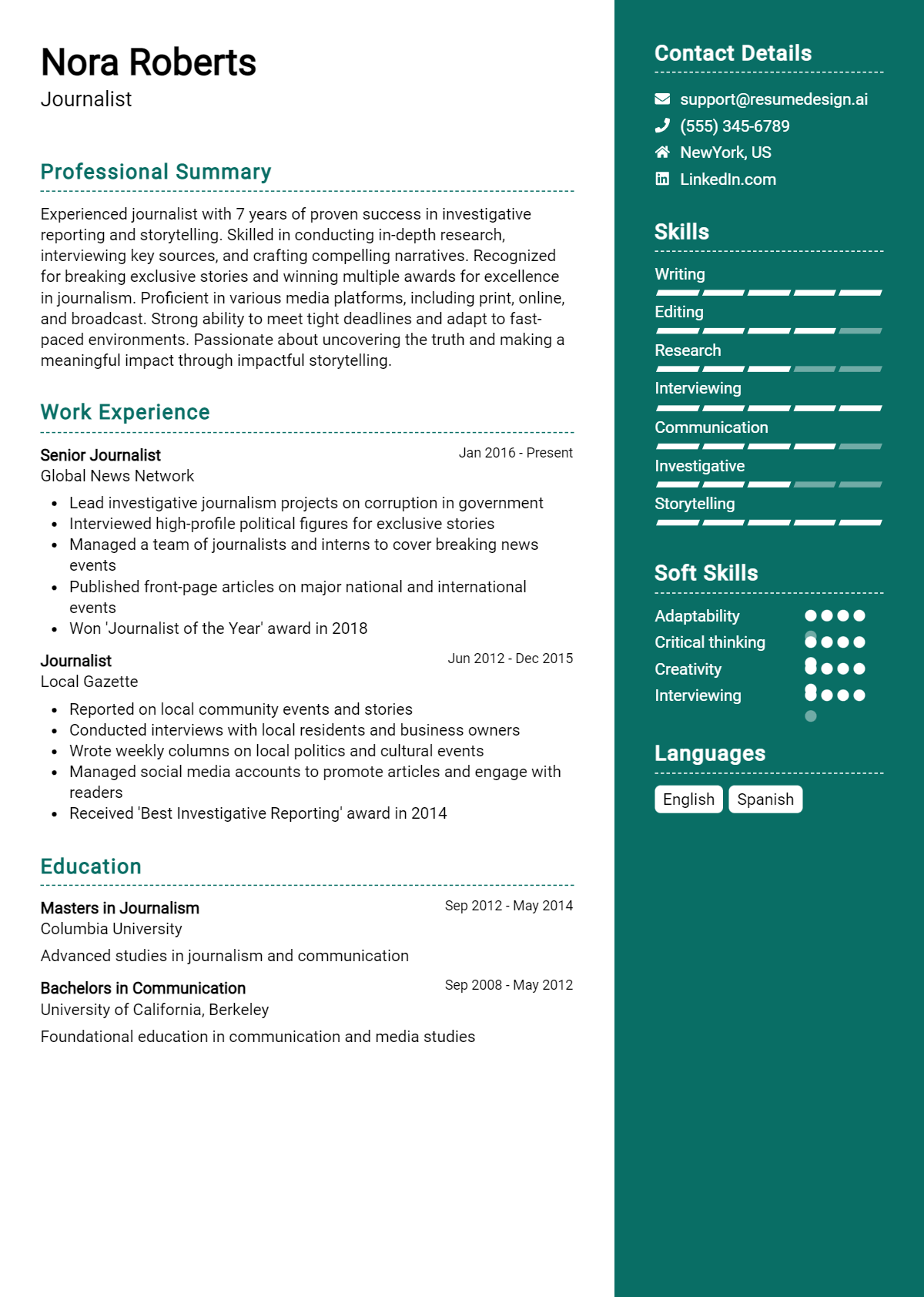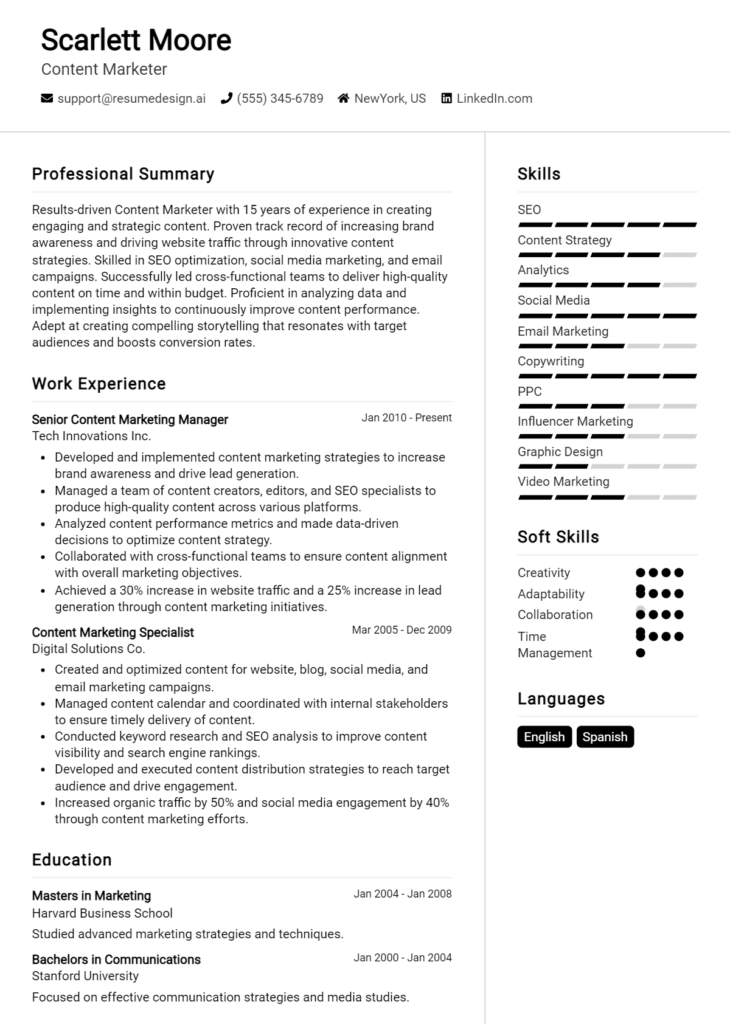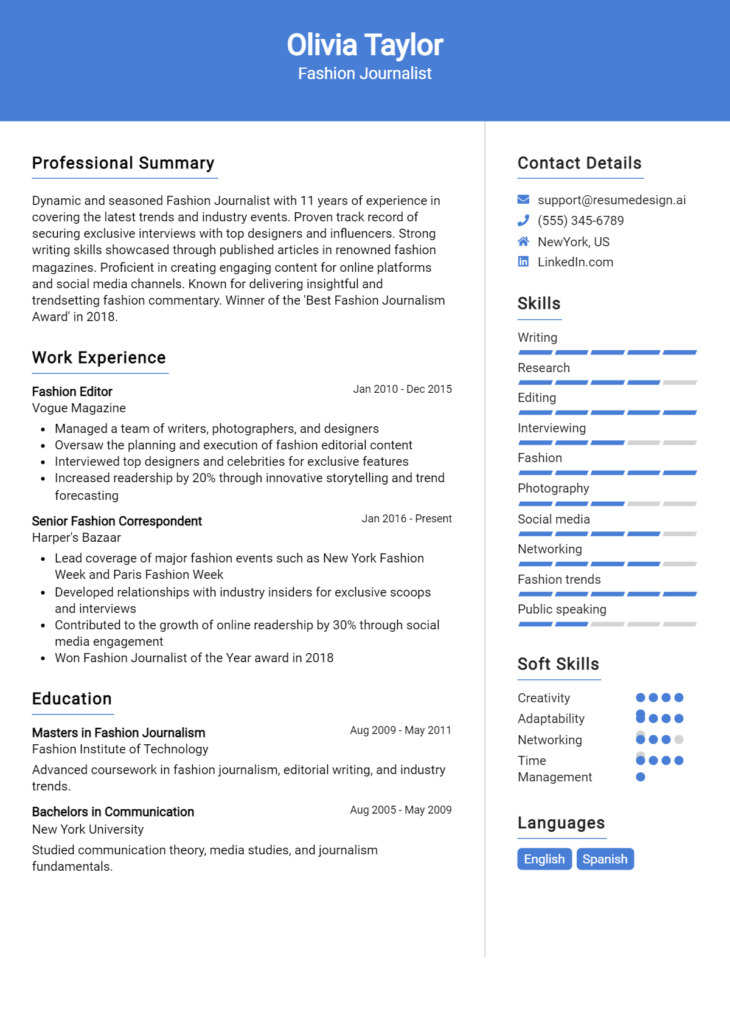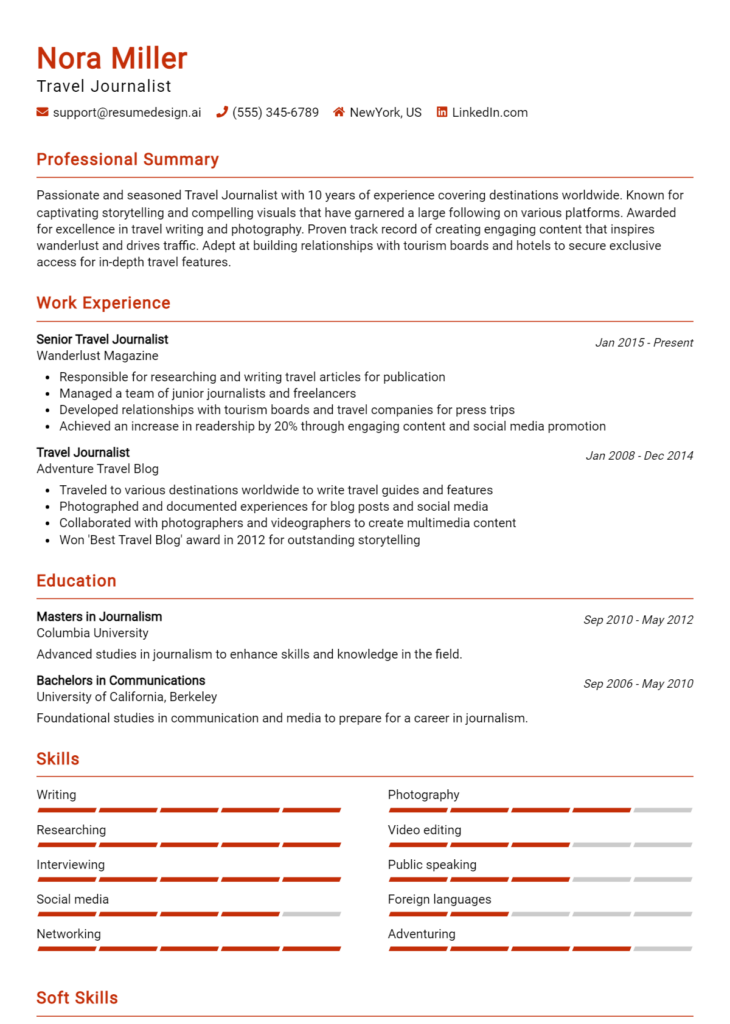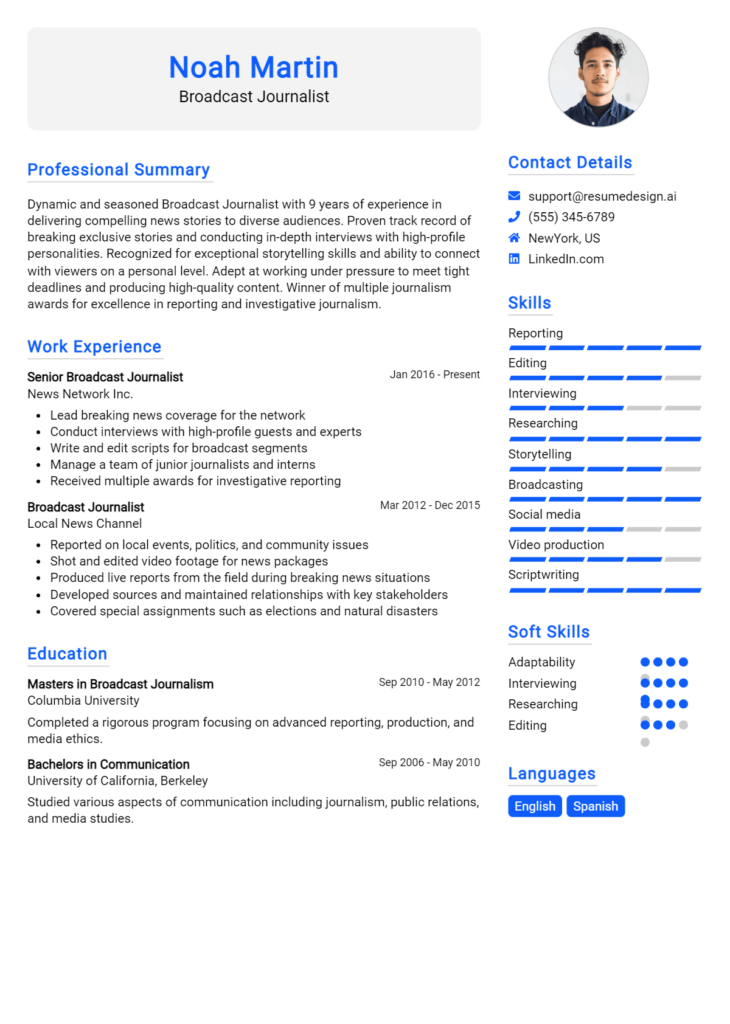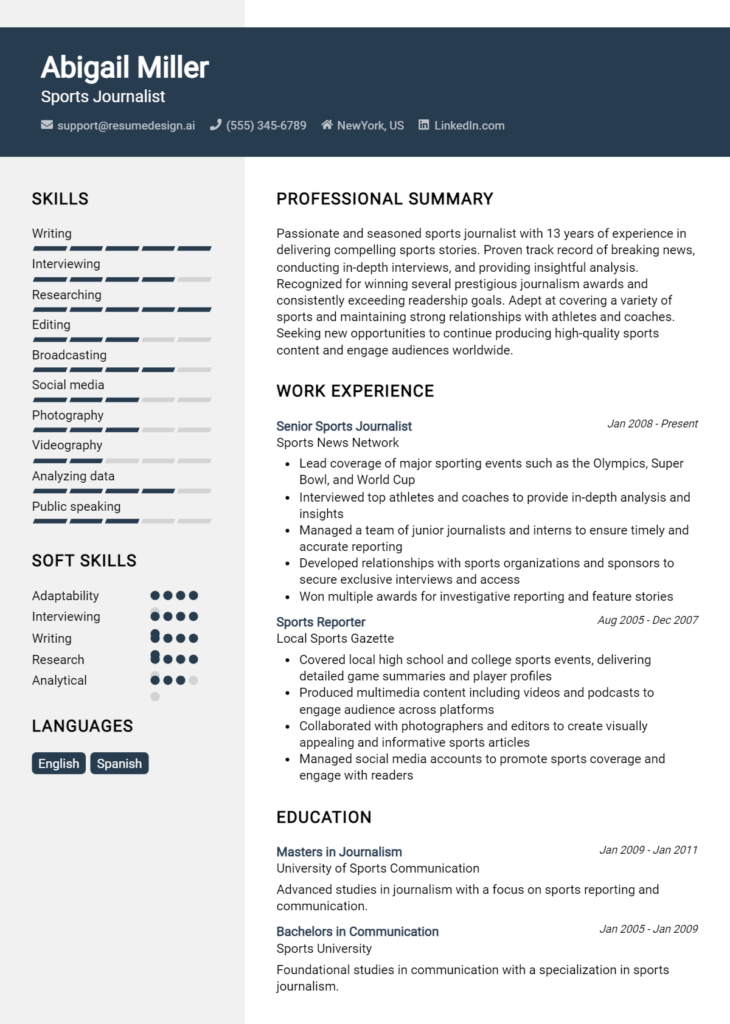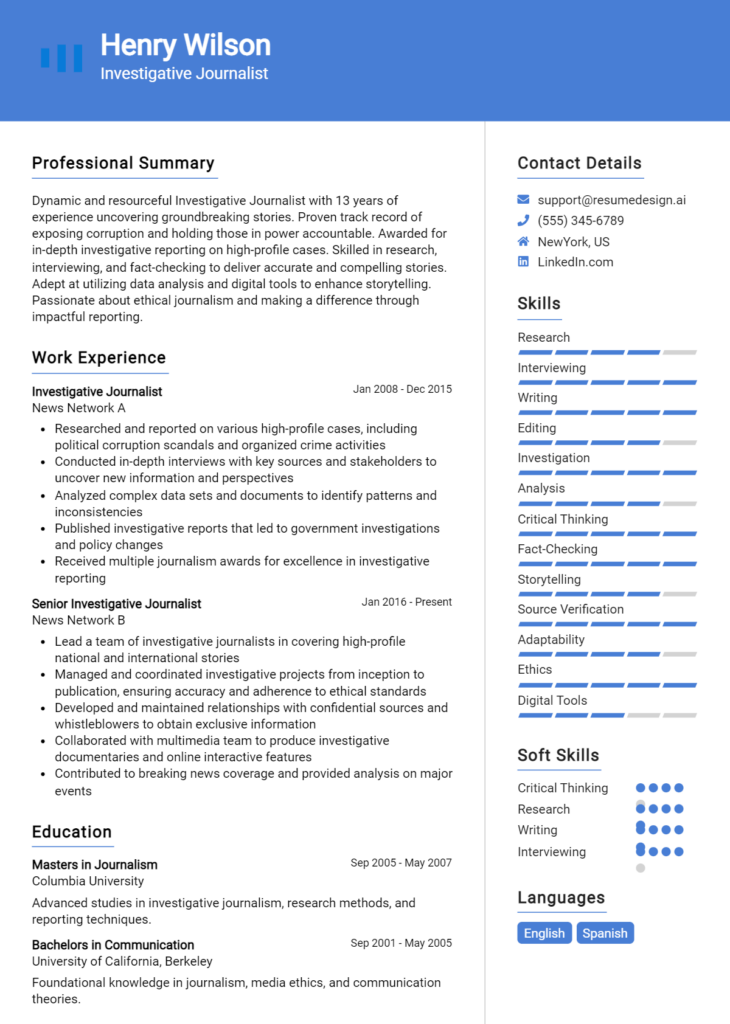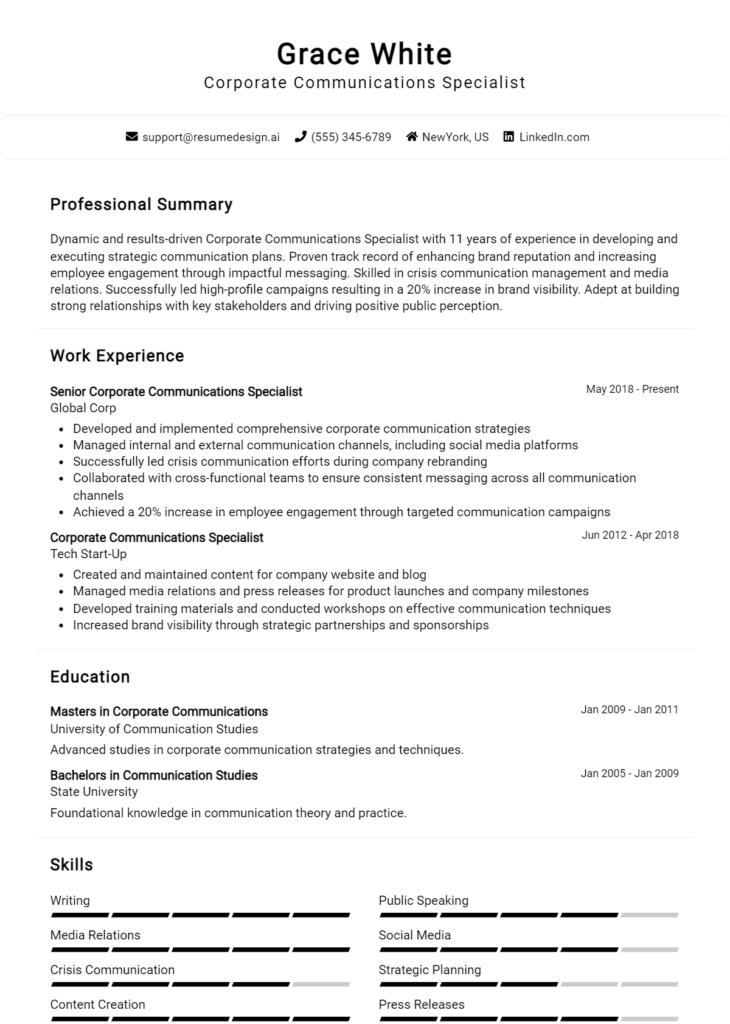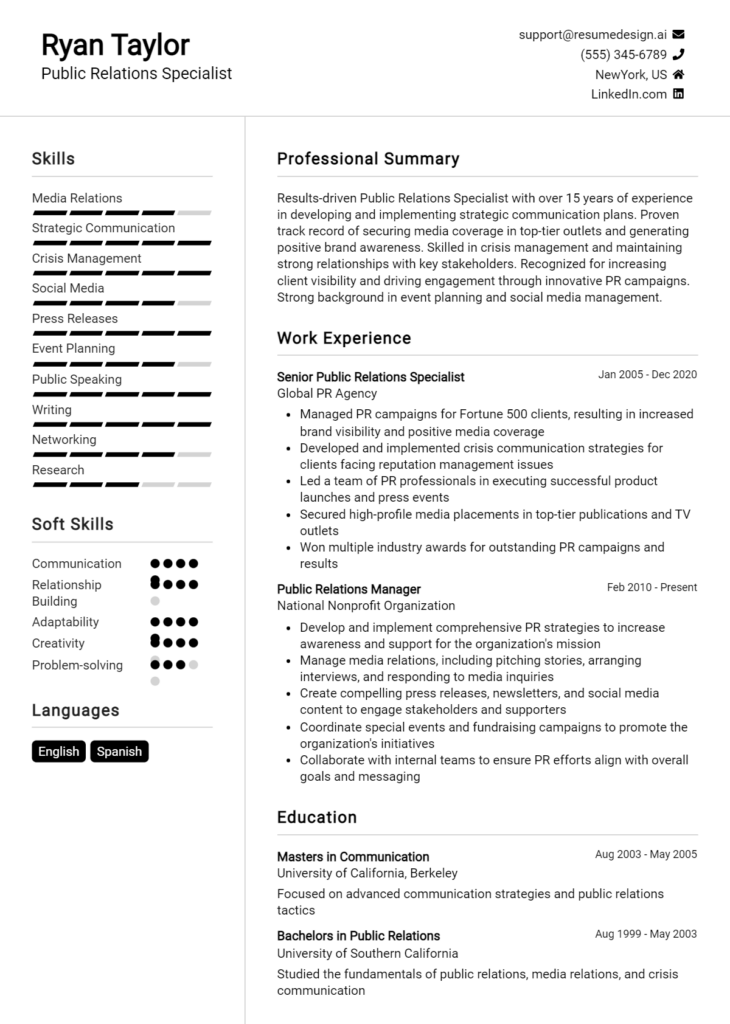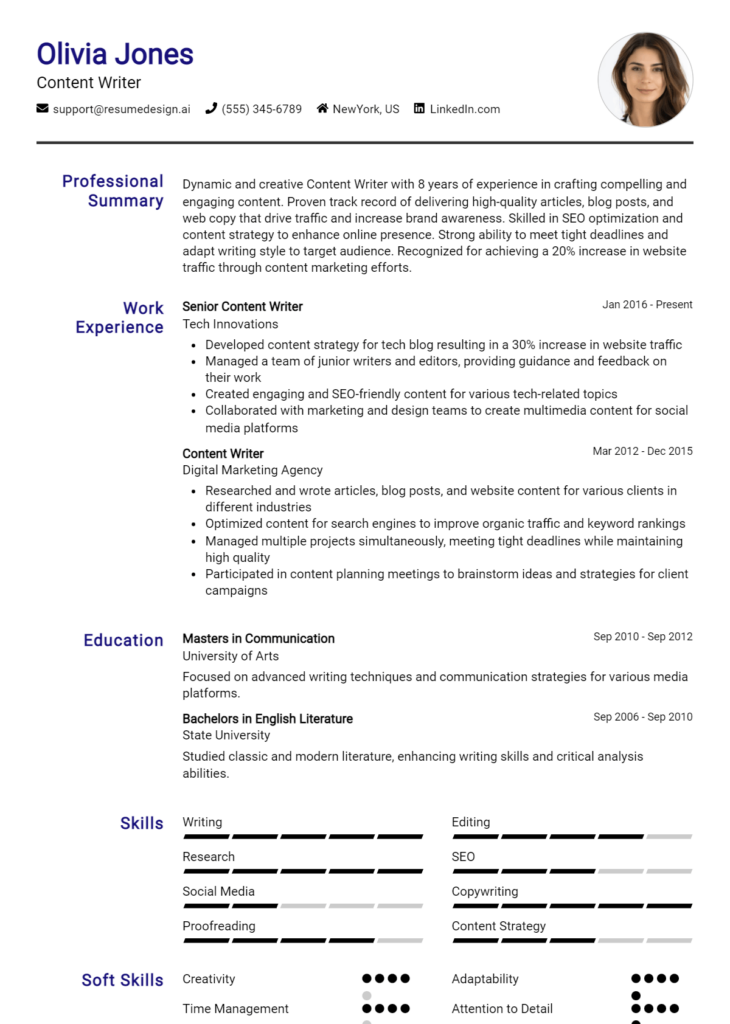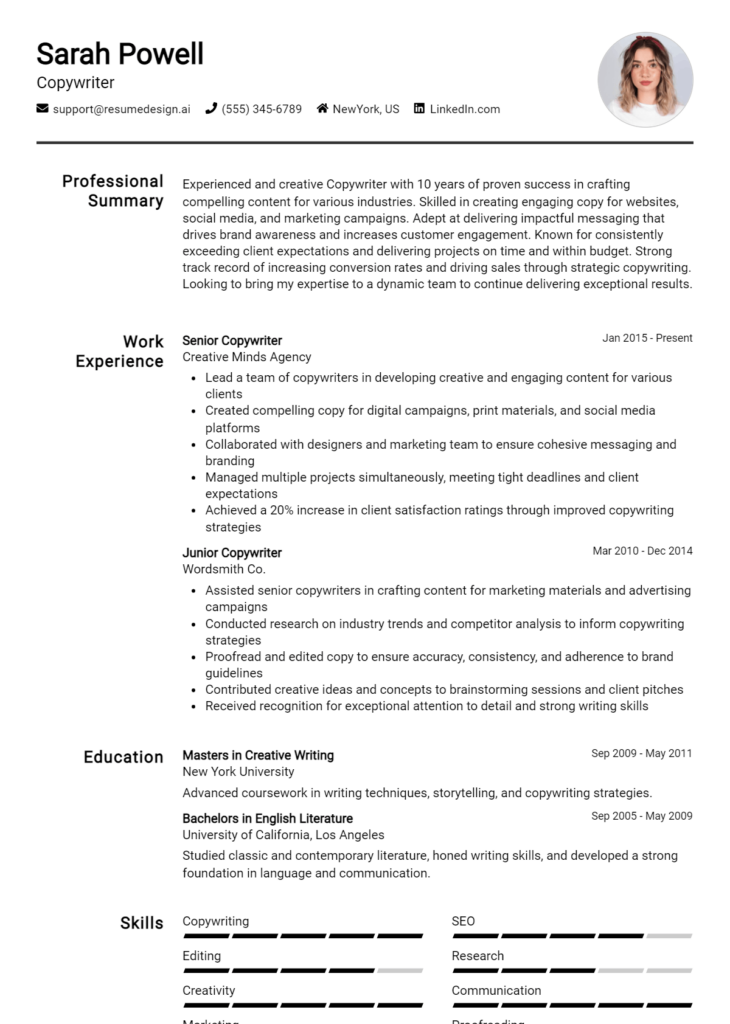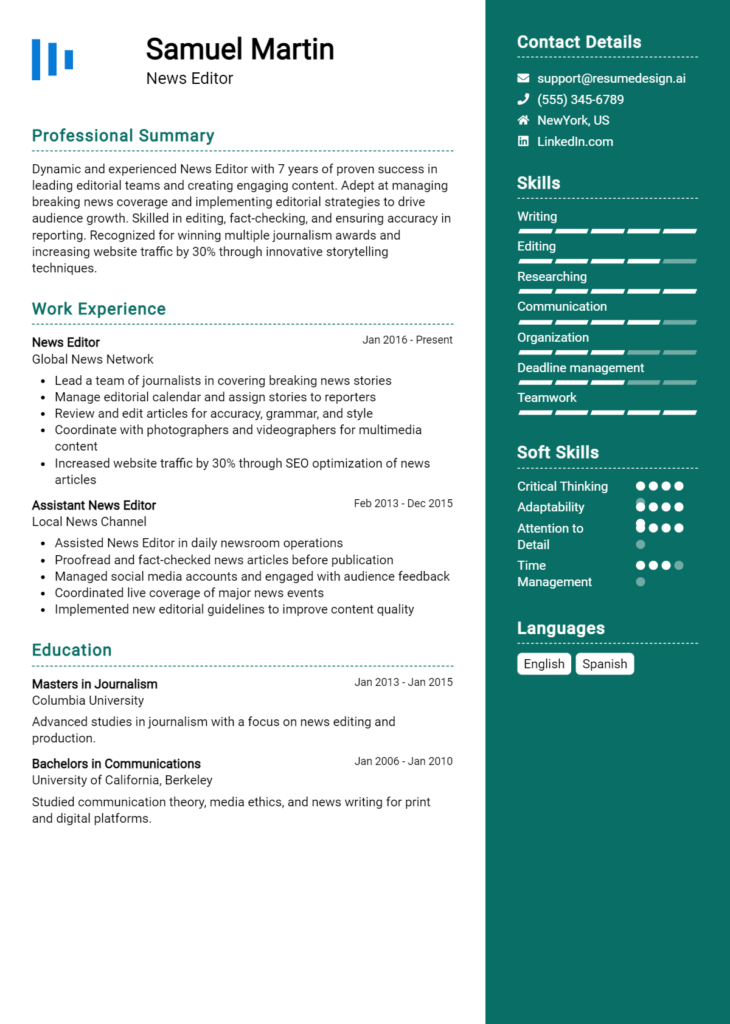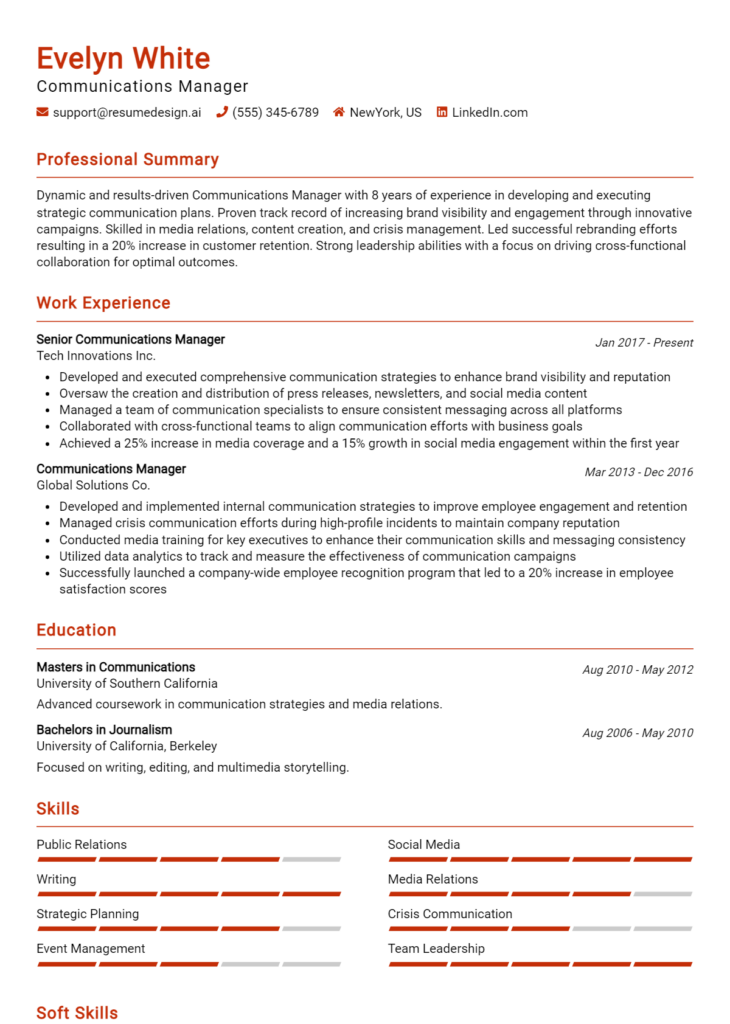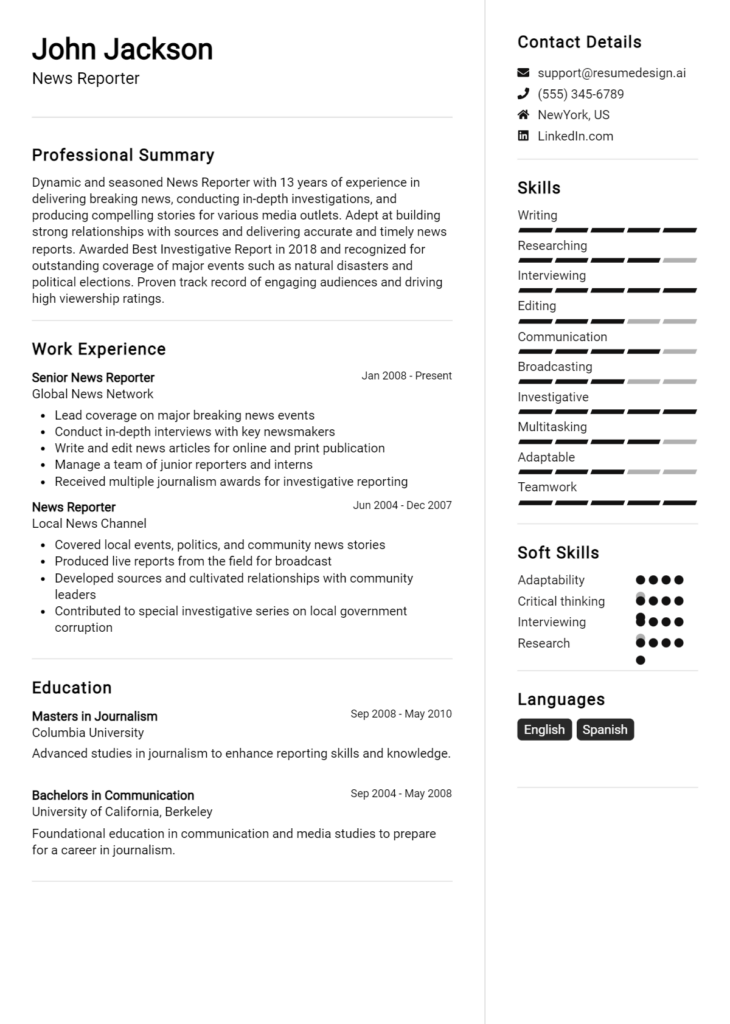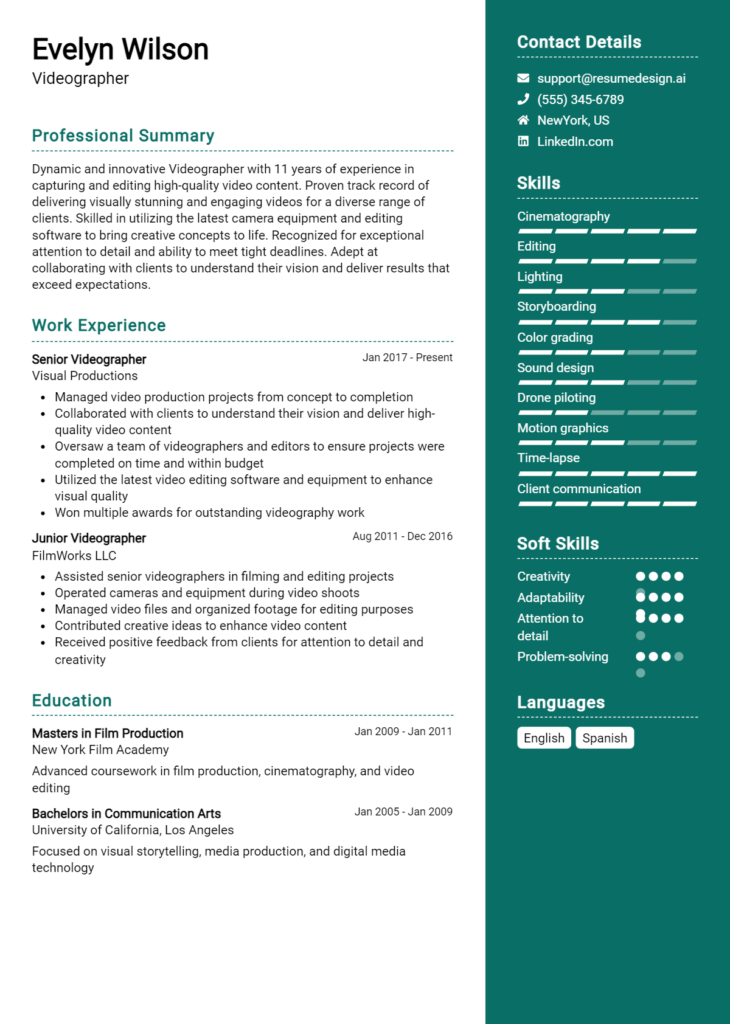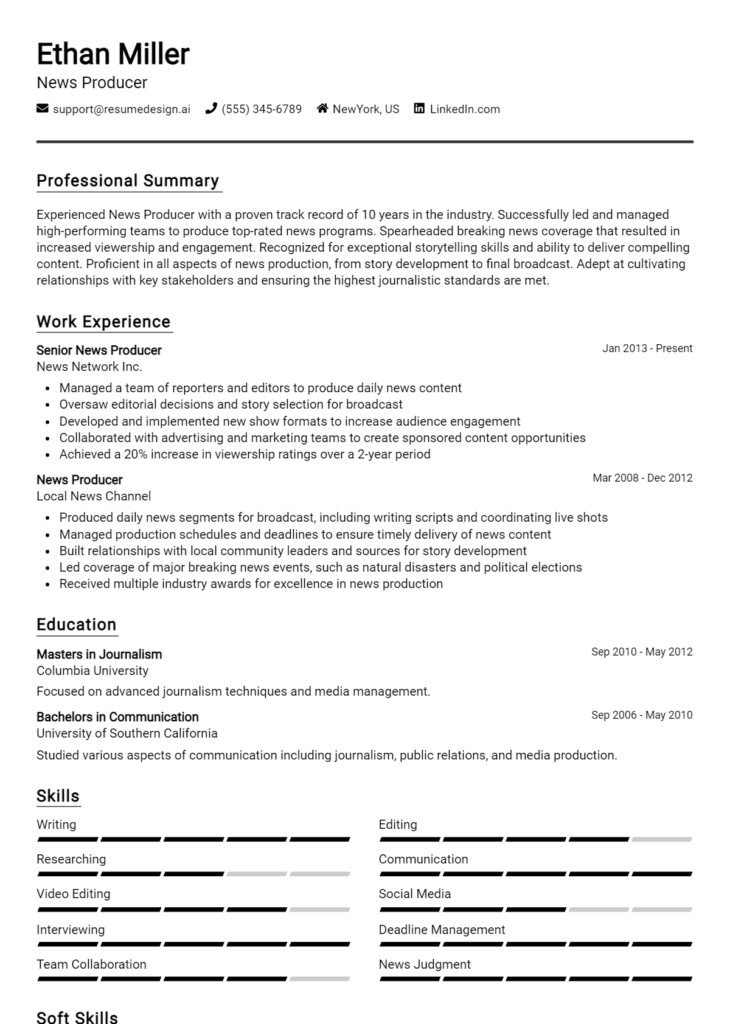Journalist Core Responsibilities
Journalists play a crucial role in informing the public by researching, investigating, and reporting news stories. They bridge different departments, such as editorial, marketing, and digital media, ensuring cohesive communication. Essential skills include strong writing, critical thinking, and technical proficiency in multimedia tools. Problem-solving abilities are vital for overcoming challenges in fast-paced environments. A well-structured resume highlighting these competencies can significantly enhance a journalist's potential to achieve the organization's overarching goals.
Common Responsibilities Listed on Journalist Resume
- Conducting interviews with sources to gather information
- Researching and verifying facts to ensure accuracy
- Writing clear, engaging news articles or reports
- Editing and proofreading content for publication
- Staying updated on current events and trends
- Developing story ideas and pitches
- Utilizing social media platforms for news dissemination
- Collaborating with photographers and video editors
- Adhering to journalistic ethics and standards
- Covering events, press conferences, and breaking news
- Creating multimedia content, including podcasts and videos
- Maintaining a network of reliable sources and contacts
High-Level Resume Tips for Journalist Professionals
In the competitive world of journalism, a well-crafted resume is not just a document; it's your first handshake with a potential employer. It serves as a crucial introduction, showcasing your skills, achievements, and unique voice as a storyteller. A strong resume can set you apart in a field where attention to detail and clarity of expression are paramount. This guide will equip you with practical and actionable resume tips specifically tailored for journalist professionals, ensuring that your first impression is as impactful as your best article.
Top Resume Tips for Journalist Professionals
- Tailor your resume to match the job description, emphasizing relevant experience and skills that align with the specific role.
- Highlight your writing style by incorporating links to published articles or online portfolios.
- Quantify your achievements by including metrics such as audience reach, engagement rates, or the number of articles published.
- Showcase your versatility by listing a variety of formats you are proficient in, such as news articles, features, podcasts, and video reports.
- Include any relevant internships or freelance work to demonstrate hands-on experience in the field.
- Emphasize your research abilities, showcasing how you gather and verify information effectively.
- Highlight your familiarity with digital tools and platforms, such as social media, content management systems, and SEO best practices.
- Demonstrate your collaboration skills by mentioning any teamwork experiences, especially in producing joint projects or investigations.
- List any awards or recognitions received, as these add credibility and showcase your commitment to excellence in journalism.
By implementing these resume tips, you can significantly enhance your chances of landing a job in the journalism field. A focused and polished resume will not only capture the attention of hiring managers but also effectively communicate your capabilities and passion for storytelling, paving the way for your next opportunity.
Why Resume Headlines & Titles are Important for Journalist
In the competitive field of journalism, a well-crafted resume headline or title serves as a powerful tool that can set a candidate apart from the rest. A strong headline captures the attention of hiring managers instantly, summarizing a journalist's key qualifications in a single impactful phrase. It acts as a hook that encourages further reading, making it essential for job seekers to articulate their unique value proposition concisely and effectively. The headline should be directly relevant to the desired position, reflecting both the applicant's expertise and the specific needs of the employer.
Best Practices for Crafting Resume Headlines for Journalist
- Keep it concise: Aim for one impactful phrase that captures your essence.
- Be role-specific: Tailor the headline to the specific journalist position you’re applying for.
- Highlight key strengths: Focus on your top skills or accomplishments that align with the job.
- Avoid jargon: Use clear language that can be easily understood by hiring managers.
- Use action words: Start with strong verbs to convey your achievements and capabilities.
- Showcase experience: Mention relevant years of experience or areas of expertise.
- Make it unique: Stand out by avoiding generic phrases and creating a distinctive title.
- Test it out: Get feedback on your headline from peers or mentors before finalizing.
Example Resume Headlines for Journalist
Strong Resume Headlines
"Investigative Journalist with 5+ Years of Experience in Uncovering the Truth"
“Award-Winning Reporter Specializing in Political Analysis and Breaking News Coverage”
“Dynamic Multimedia Journalist with Proven Skills in Storytelling and Audience Engagement”
Weak Resume Headlines
“Journalist Looking for Opportunities”
“Experienced Writer”
The strong headlines are effective because they clearly communicate the candidate's areas of expertise and years of experience, making it easy for hiring managers to gauge their fit for the role. In contrast, the weak headlines fall short due to their vagueness and lack of specific information, failing to convey any unique value or relevant qualifications. A powerful resume headline not only attracts attention but also sets the tone for the rest of the resume, encouraging a deeper look into the candidate's credentials.
Writing an Exceptional Journalist Resume Summary
A well-crafted resume summary is essential for any journalist aiming to make a strong impression on hiring managers. In today's competitive job market, your resume summary serves as a powerful elevator pitch, quickly capturing the attention of potential employers by highlighting your key skills, relevant experience, and notable accomplishments. A strong summary should be concise and impactful, tailored specifically to the job you are applying for, ensuring that it resonates with the hiring team and aligns with their requirements.
Best Practices for Writing a Journalist Resume Summary
- Quantify Achievements: Use numbers to demonstrate the impact of your work, such as audience growth or successful story placements.
- Focus on Relevant Skills: Highlight skills that are directly applicable to the journalism role, such as research, writing, and multimedia storytelling.
- Tailor Your Summary: Customize your summary for each job application to reflect the specific requirements and preferences mentioned in the job description.
- Keep it Concise: Aim for 2-4 sentences that capture your essence without overwhelming the reader.
- Use Action Verbs: Start with strong action verbs to convey confidence and proactivity in your writing.
- Showcase Unique Selling Points: Emphasize what sets you apart from other candidates, such as specialized expertise or unique experiences.
- Maintain Professional Tone: Keep your language professional and engaging, avoiding overly casual phrases or jargon.
- Proofread for Clarity: Ensure your summary is free from grammatical errors and typos, reflecting your attention to detail.
Example Journalist Resume Summaries
Strong Resume Summaries
Dynamic journalist with over 7 years of experience in investigative reporting, resulting in a 30% increase in readership for published pieces. Skilled in data analysis and multimedia storytelling, with a proven track record of delivering compelling narratives under tight deadlines.
Award-winning journalist with a decade of experience covering political issues, successfully breaking multiple exclusive stories that garnered national attention. Proficient in digital content creation and social media engagement, leading to a 50% increase in online following for my previous publication.
Versatile reporter with a passion for human-interest stories, having published over 200 articles in top-tier publications. Recognized for excellence in journalism through various accolades, including the XYZ Award for Best Feature Story, showcasing an ability to connect with diverse audiences.
Weak Resume Summaries
Experienced journalist looking for opportunities to write and report on various topics. I have a good understanding of the industry and can work well under pressure.
Journalist with some experience in news writing and reporting. I am a team player and am eager to learn more about the field.
The examples provided illustrate the key differences between strong and weak resume summaries. Strong summaries clearly communicate specific accomplishments, quantify results, and highlight relevant skills, making them impactful and tailored for the role. In contrast, weak summaries lack detail, specificity, and quantifiable outcomes, which can make them less appealing to hiring managers and fail to showcase the candidate's true potential.
Work Experience Section for Journalist Resume
The work experience section of a Journalist resume is a critical component that highlights a candidate's technical skills, leadership capabilities, and ability to produce high-quality content under tight deadlines. This section serves as evidence of the journalist's ability to navigate the complexities of the media landscape, manage teams, and deliver impactful stories that resonate with audiences. By quantifying achievements and aligning past experiences with industry standards, candidates can effectively demonstrate their value to potential employers and their readiness to contribute to the team.
Best Practices for Journalist Work Experience
- Focus on quantifiable achievements, such as audience growth or increased engagement metrics.
- Highlight specific technical skills relevant to journalism, including proficiency in multimedia editing or data analysis.
- Emphasize collaboration by detailing experiences in team projects or cross-departmental initiatives.
- Use action verbs to convey a sense of proactivity and impact in your roles.
- Tailor your work experience to reflect the job description and industry trends.
- Incorporate awards or recognitions that validate your contributions and excellence in journalism.
- Showcase adaptability by mentioning experiences in diverse media formats or platforms.
- Maintain clarity and conciseness while ensuring your achievements are easily digestible.
Example Work Experiences for Journalist
Strong Experiences
- Led a team of five journalists to produce a series of investigative reports that increased readership by 30% over six months.
- Developed an interactive online feature that engaged over 50,000 users, resulting in a 25% increase in website traffic.
- Collaborated with data analysts to create a groundbreaking data-driven article, which received a regional journalism award.
- Managed the editorial calendar and streamlined content production processes, reducing turnaround time by 20%.
Weak Experiences
- Wrote articles for the local newspaper.
- Assisted in covering various events.
- Participated in team meetings.
- Helped with social media posts.
The examples categorized as strong experiences are considered impactful because they highlight specific achievements, quantify results, and demonstrate leadership and collaboration. Each bullet point reflects a clear contribution to the organization’s goals and showcases the candidate's ability to drive results in a competitive environment. Conversely, the weak experiences lack detail and specificity, making it difficult to gauge the candidate's skills or achievements, which diminishes their overall impact on the resume.
Education and Certifications Section for Journalist Resume
The education and certifications section of a journalist's resume is a crucial element that showcases the candidate's academic achievements, industry-relevant certifications, and commitment to continuous learning. This section not only emphasizes the journalist's educational background but also highlights any specialized training that aligns with the demands of the role. By including relevant coursework and certifications, candidates can significantly enhance their credibility, demonstrating their preparedness for the fast-paced and ever-evolving field of journalism. A well-crafted education and certifications section can effectively communicate a candidate's qualifications and dedication to their craft, making them stand out to potential employers.
Best Practices for Journalist Education and Certifications
- Focus on relevant degrees and certifications that directly relate to journalism.
- Include specialized training or workshops that enhance your skills in reporting, editing, or multimedia.
- Highlight any advanced degrees, such as a Master's in Journalism or Communications.
- List relevant coursework that demonstrates expertise in specific areas, such as investigative journalism or digital media.
- Keep details concise but informative, ensuring clarity on how each qualification applies to the job role.
- Include industry-recognized certifications, such as those from the Society of Professional Journalists (SPJ) or online journalism courses from accredited institutions.
- Update your education section regularly to reflect any new qualifications or relevant learning experiences.
- Consider including honors or awards received during your academic career that showcase excellence in journalism.
Example Education and Certifications for Journalist
Strong Examples
- Bachelor of Arts in Journalism, University of California, Berkeley, 2020
- Certified Professional Journalist (CPJ) from the National Press Photographers Association, 2021
- Relevant Coursework: Investigative Reporting, Multimedia Storytelling, and Ethical Journalism
- Master’s Degree in Communications, Columbia University, 2022
Weak Examples
- Associate Degree in General Studies, Community College, 2018
- Certification in Basic Computer Skills, Online Course, 2019
- High School Diploma, Local High School, 2016
- Outdated certification in Print Journalism, 2015
The strong examples presented above are considered effective as they directly relate to journalism and demonstrate advanced qualifications, showcasing the candidate's preparedness for a career in the field. These examples highlight relevant degrees and certifications that match the job requirements, enhancing the candidate's credibility. In contrast, the weak examples lack relevance to journalism, either being too general or outdated, which does not effectively showcase the candidate's suitability for the role. These qualifications may not meet the expectations of employers seeking specialized skills and knowledge in journalism.
Top Skills & Keywords for Journalist Resume
In the competitive field of journalism, having the right skills is crucial for standing out to potential employers. A well-crafted journalist resume should not only highlight relevant experiences but also emphasize both hard and soft skills that demonstrate a candidate's capability to thrive in a dynamic environment. The blend of these skills showcases a journalist's ability to research, report, and engage effectively with diverse audiences. By focusing on the essential skills, journalists can enhance their resumes and increase their chances of landing interviews in an ever-evolving media landscape. For more insights on how to effectively incorporate skills into your resume, check out this skills guide.
Top Hard & Soft Skills for Journalist
Soft Skills
- Strong communication
- Critical thinking
- Adaptability
- Team collaboration
- Time management
- Creativity
- Empathy
- Networking ability
- Attention to detail
- Problem-solving
Hard Skills
- Research proficiency
- Writing and editing
- Multimedia storytelling
- Data analysis
- SEO optimization
- Social media management
- Interviewing techniques
- Fact-checking
- Knowledge of AP style
- Photography and videography skills
A well-rounded journalist should possess a combination of these skills to navigate the demands of the profession effectively. Additionally, showcasing relevant work experience can further strengthen a journalist's resume by providing concrete examples of how these skills have been applied in real-world situations.
Stand Out with a Winning Journalist Cover Letter
Dear [Hiring Manager's Name],
I am writing to express my enthusiasm for the Journalist position at [Company Name] as advertised on [Job Board/Company Website]. With a Bachelor’s degree in Journalism from [Your University] and over [X years] of experience in reporting, editing, and multimedia storytelling, I am excited about the opportunity to contribute to your team. My strong commitment to uncovering the truth, combined with my ability to engage audiences through compelling narratives, makes me a perfect fit for your publication.
Throughout my career, I have developed a diverse portfolio that showcases my ability to cover a wide range of topics, from local news and politics to culture and technology. My recent work at [Previous Company] involved investigative reporting that led to significant community changes, demonstrating my dedication to impactful journalism. I am adept at conducting thorough research, interviewing sources, and crafting engaging articles that resonate with readers. I pride myself on my ability to remain adaptable in fast-paced environments, ensuring that I can meet tight deadlines while maintaining high journalistic standards.
Moreover, my proficiency in digital media and social platforms allows me to reach and engage with a broader audience. I have successfully integrated multimedia elements into my stories, including podcasts and video interviews, enhancing the storytelling experience. I am particularly drawn to [Company Name] due to its innovative approach to journalism and commitment to delivering quality content. I am eager to bring my skills in research, writing, and digital storytelling to your team, contributing to your mission of informing and inspiring your audience.
Thank you for considering my application. I look forward to the opportunity to discuss how my background, skills, and enthusiasm for journalism can align with the goals of [Company Name]. I am excited about the possibility of contributing to your esteemed publication and am available for an interview at your earliest convenience.
Sincerely,
[Your Name]
[Your Contact Information]
[Your LinkedIn Profile or Portfolio Link]
Common Mistakes to Avoid in a Journalist Resume
When crafting a resume as a journalist, it's crucial to present your skills and experiences in a clear and compelling manner. However, many applicants fall into common pitfalls that can hinder their chances of landing an interview. Identifying and avoiding these mistakes can significantly enhance your resume and help you stand out in a competitive field. Below are some prevalent missteps to watch out for:
Generic Objective Statement: Using a one-size-fits-all objective can make your resume feel impersonal. Tailor your statement to reflect your specific goals and how they align with the position you’re applying for.
Lack of Quantifiable Achievements: Simply listing job duties without showcasing your accomplishments can weaken your resume. Include metrics or specific results from your work, such as audience growth percentages or successful story pitches.
Overloading with Jargon: While industry-specific terminology is important, overusing jargon can alienate hiring managers. Strive for clarity and ensure your resume is accessible to a broader audience.
Neglecting Formatting: A cluttered or poorly organized resume can be off-putting. Use clear headings, bullet points, and consistent formatting to improve readability and create a professional appearance.
Ignoring Online Presence: In today's digital age, many journalists maintain an online portfolio or blog. Failing to include links to your work can make your resume less compelling. Always provide easy access to your best pieces.
Excessive Length: A resume that exceeds one page can overwhelm hiring managers. Be concise and focus on the most relevant experiences and skills that pertain to the job you are applying for.
Typos and Grammatical Errors: As a journalist, your writing skills are under scrutiny from the moment your resume is reviewed. Ensure your document is free of typos, grammatical mistakes, and formatting inconsistencies.
Lack of Tailoring for Each Job: Sending out a generic resume for multiple applications can be detrimental. Customize your resume for each position to highlight experiences and skills that directly relate to the job description.
Conclusion
In this article, we explored the essential skills and attributes that make a successful journalist, including strong writing abilities, research proficiency, and effective communication. We discussed the importance of staying updated with current events and being adaptable in a rapidly changing media landscape. Moreover, we highlighted the value of networking and building relationships within the industry to enhance career opportunities.
As you reflect on the insights shared, it’s crucial to ensure your journalist resume effectively showcases your skills and experiences. A well-crafted resume can make a significant difference in landing your desired job in journalism.
We encourage you to take action now: review your resume and consider utilizing available resources to enhance your application. You can access a variety of tools, including resume templates, a resume builder, resume examples, and cover letter templates. With these resources at your disposal, you can create a standout resume that accurately reflects your capabilities and helps you take the next step in your journalism career.

